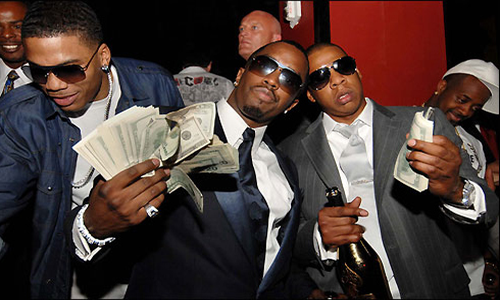We see it in every video, awards show, and every tv appearance. Most rappers are showing their jewelry, cars, private jets, yachts, and houses. The illusion that is presented is that most of these items either came from rap money or drug money. Who are we kidding here? Majority of rappers didn’t get these items from drug money. Sure, some may have came from rap money. But your Jay-Z’s, Diddy’s, 50 Cent’s, Nicki Minaj’s, Baby from Cash Money, and T.I.’s all have something in common: Investments. Investments in different securities is what is allowing these rappers money to grow vastly and live the lifestyle that they are living. Unfortunately, you rarely hear them rapping about these investments in a song.
50 Cent had Vitamin Water, Diddy had Ciroc, Jay-Z has the Brooklyn Nets and Ace of Spades. All of these are notable investments in popular companies. But lets talk about some simple investments that can grow money (I’m positive they are using these methods to invest their money as well). The oldest tangible asset is real estate.
Real Estate
Money is gained and lost as markets go up and down. But some savvy investors make money regardless of the market. For example, in a declining market, it would be advantageous to buy real estate that is for sale for pennies on the dollar. These are short sales and foreclosures. One of the best kept secrets is buying real estate at a real estate auction. When I say buying real estate for pennies on the dollar, I mean pennies on the dollar. Buy this type of real estate for cheap, put some money in it, and adapt to the market accordingly. If the market is not favorable, rent the property out for profit. If the market is trending upwards, then sell it for double the price. You need capital to do this, right? Pull money from your 401k, get a home loan, or consider using a hard money lender.
Stocks
A share of stock is literally a share in the ownership of a company. When you buy a share of stock, you’re entitled to a small fraction of the assets and earnings of that company. Assets include everything the company owns (buildings, equipment, trademarks), and earnings are all of the money the company brings in from selling its products and services. Some look at stocks as legalized gambling. And to a certain extent, it is. However, there are a couple of ratios you need to know about before you buy any stock. Here are a couple below:
- Earning Per Share (EPS): The ideal situation occurs when operating cash flow per share exceeds GAAP EPS
- Price To Earnings (P/E): A high P/E ratio means investors are paying more for today’s earnings in anticipation of future earnings growth.
- Price To Sales: Like the P/E ratio, the P/S reflects how many times investors are paying for every dollar of a company’s sales.
- Debt to Equity: This is a measurement of how much suppliers, lenders, creditors and obligors have committed to the company versus what the shareholders have committed. A lower number means that a company is using less leverage and has a stronger equity position.
- Payout Ratio: This ratio tells you how much profit goes out in dividends. Dividends are paid at the discretion of management, if the percentage is too high (over about 75%) then the dividend could be cut. If the result is low then the dividend payment could continue into the future.
- Current Ratio: The current ratio is a popular financial ratio used to test a company’s liquidity by deriving the proportion of current assets available to cover current liabilities. In theory, the higher the current ratio, the better.
Bonds:
 This is a debt security that can be used as a savvy savings tool. Understanding a few key concepts and a little bit of terminology will help you navigate the ins and outs of bond investing. Bonds are simply a way for governments and companies to borrow money. Instead of borrowing money from a bank, a company or government can sell bonds to a large group of investors to raise the funds it needs to operate or grow. Issuing a bond is usually less expensive than a bank loan and tends to offer more flexibility.
This is a debt security that can be used as a savvy savings tool. Understanding a few key concepts and a little bit of terminology will help you navigate the ins and outs of bond investing. Bonds are simply a way for governments and companies to borrow money. Instead of borrowing money from a bank, a company or government can sell bonds to a large group of investors to raise the funds it needs to operate or grow. Issuing a bond is usually less expensive than a bank loan and tends to offer more flexibility.
Bonds are issued in varying term lengths, and may mature in the very short term (days or months), short term (one to five years), medium term (six to 10 years) or long term (more than 12 years). Typically, the longer the term of the bond, the higher the coupon rate on the bond will be. The coupon rate simply tells the investor the amount of interest he or she will get over the life of the bond. For example, a bond with a 5% coupon rate and a $1,000 face value will pay the bondholder $50 each year.
But government bonds, like U.S. Treasury bonds, are relatively easy for individuals to buy in the primary market. Government bonds, including municipal bonds, generally have lower yields, but also have less risk and more tax advantages than corporate bonds. Government bonds are also much less complex investments, perfect for a beginning bond investor. There’s no need for a broker — you can purchase bonds directly from the U.S. Treasury at TreasuryDirect.
[fbcomments url=”http://urbanmoney.org/project/here-is-a-method-that-is-helping-some-rappers-become-wealthy/” width=”790″ count=”off” num=”30″ countmsg=”wonderful comments!”]

















